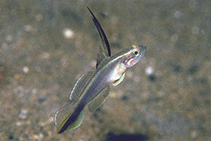| Family: |
Gobiidae (Gobies), subfamily: Gobiinae |
| Max. size: |
5 cm TL (male/unsexed) |
| Environment: |
demersal; marine; depth range 1 - 20 m |
| Distribution: |
Western Central Pacific: Papua New Guinea. |
| Diagnosis: |
Dorsal spines (total): 6-7; Dorsal soft rays (total): 10-10; Anal spines: 1-1; Anal soft rays: 9-10. Characterized by brown body color and median fins; breast and abdomen whitish; white to yellowish stripe from eye to upper caudal peduncle; white stripe below eye to opercle; second dorsal and upper caudal fins with blue margins; board dark brown stripe encompassing middle caudal fin rays; greatly elongated first dorsal fin; united pelvic fins, frenum present; longitudinal scale series 45-55; head without scales; greatest depth of body 5.8-6.3 in SL; lanceolate caudal fin, longer than head length (Ref. 90102). |
| Biology: |
Inhabits muddy burrows and occurs between 1 and 20 meters depth (Ref. 48637). Also found in silt and sand bottoms of sheltered reefs (Ref 90102). |
| IUCN Red List Status: |
Least Concern (LC); Date assessed: 14 August 2023 Ref. (130435)
|
| Threat to humans: |
harmless |
Source and more info: www.fishbase.org. For personal, classroom, and other internal use only. Not for publication.
